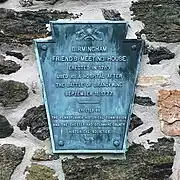Birmingham Friends Meetinghouse
Birmingham Friends Meetinghouse is a historic Quaker meeting house at 1245 Birmingham Road in Birmingham Township, Chester County, Pennsylvania. The current meetinghouse was built in 1763. The building and the adjacent cemetery were near the center of fighting on the afternoon of September 11, 1777 at the Battle of Brandywine. Worship services are held weekly at 10am.[3] The meetinghouse and adjacent octagonal schoolhouse were listed on the National Register of Historic Places as Birmingham Friends Meetinghouse and School on July 27, 1971.[4][5]
Birmingham Friends Meetinghouse and School | |
 Front view in 2017 | |
  | |
| Location | 1245 Birmingham Road, Birmingham Township, Chester County, Pennsylvania |
|---|---|
| Coordinates | 39°54′20″N 75°35′42″W |
| Area | 2.4 acres (0.97 ha) |
| Built | 1763 |
| NRHP reference No. | 71000688[1] |
| Significant dates | |
| Added to NRHP | July 27, 1971 |
| Designated PHMC | September 1915[2] |
History
The first Quaker meeting in Birmingham Township was held about 1690. In 1718 a meetinghouse was built from red cedar logs. A burial ground, surrounded by a stone wall, was established in the 1750s. The building was made out of stone in 1763 and measured 38 by 41 feet. During the Battle of Brandywine, the British forces attempted to flank the Continental forces under General George Washington. The Continental forces rushed north to meet the British in the area of the meetinghouse. It was used as a hospital first for the Americans, and after the battle for British officers. The stone wall around the cemetery was used as a defensive position by the Americans. After the battle, dead British and American soldiers shared a common grave in the cemetery.
The meetinghouse was enlarged in 1819 and an octagonal school was completed in August, 1819 at a cost of $712.57. The school was used off and on through 1905 and is included in the NRHP site. In 1968 Quaker architect Mather Lippincott designed a new education building to the north of the meeting house.[4][6]
The school is now used as The Peace Center at Birmingham.[7]
From 1845 to 1923 a group of Quakers worshipped a few hundred yards south at the Orthodox Meetinghouse as a result of the Hicksite-Orthodox split. That meetinghouse is listed separately on the NRHP.[8]
Gallery
 The octagonal school next to the meetinghouse.
The octagonal school next to the meetinghouse. 1915 Historical Marker
1915 Historical Marker Defensive stone wall position at the Birmingham Friends Burial Grounds.
Defensive stone wall position at the Birmingham Friends Burial Grounds. 1922 plaque marking line of defense
1922 plaque marking line of defense Common grave memorial stone on the Brandywine battlefield, Birmingham Friends Burial Grounds.
Common grave memorial stone on the Brandywine battlefield, Birmingham Friends Burial Grounds.
References
- "National Register Information System". National Register of Historic Places. National Park Service. March 13, 2009.
- "PHMC Historical Markers". Pennsylvania Historical Marker Database. Pennsylvania Historical & Museum Commission. Archived from the original on December 7, 2013. Retrieved December 20, 2013.
- Birmingham Monthly Meeting Archived 2011-06-25 at the Wayback Machine, accessed February 3, 2011.
- "National Historic Landmarks & National Register of Historic Places in Pennsylvania" (Searchable database). CRGIS: Cultural Resources Geographic Information System. Note: This includes Pennsylvania Historical and Museum Commission (December 1970). "National Register of Historic Places Inventory Nomination Form: Birmingham Friends Meetinghouse and School" (PDF). Retrieved 2012-10-30.
- "Historic Resource Information: Birmingham Friends Meetinghouse & School" – via CRGIS: Cultural Resources Geographic Information System for Pennsylvania.
- Birmingham Friends History Archived 2011-02-27 at the Wayback Machine, accessed February 2, 2011.
- Birmingham Monthly Meeting - about us Archived 2011-07-25 at the Wayback Machine, accessed February 2, 2011.
- "National Historic Landmarks & National Register of Historic Places in Pennsylvania" (Searchable database). CRGIS: Cultural Resources Geographic Information System. Note: This includes Elanor Webster (1971). "National Register of Historic Places Inventory Nomination Form: Orthodox Meetinghouse" (PDF). Retrieved 2012-10-30.
Further reading
- Brief Historical Sketches concerning Friends' Meetings of the Past and Present with special reference to Philadelphia Yearly Meeting, compiled by T. Chalkey Matlack, Moorestown, N.J. 1938, pp. 285–288. Available at the Friends Historical Library at Swarthmore College.
External links
- Birmingham Friends Website
- Historic American Buildings Survey (HABS) No. PA-1193, "Birmingham Friends Meetinghouse", 5 photos, 5 measured drawings, 7 data pages
- HABS No. PA-5138, "Birmingham Octagonal Schoolhouse", 1 photo, 1 photo caption page
- "Birmingham Friends Meeting House". The Historical Marker Database.
- "The Friends School at Birmingham Meeting House". The Historical Marker Database.
- "First Defense Line, American Army". The Historical Marker Database.

